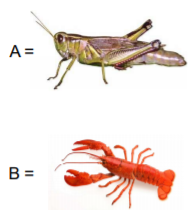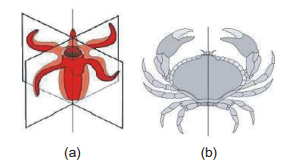Correct flow water current in sponges is:-
1. Ostia OsculumSpongocoelOutside
2. OsculumSpongocoelOstiaOutside
3. OstiaSpongocoelOsculumOutside
4. OsculumOstiaSpongocoelOutside
Tube within a tube plan is found in
1. Coelenterata
2. Ctenophora
3. Platyhelminthes
4. Aschelminthes
Which of the following is not correct comparison between Locusta (A) and Prawn (B), illustrated in the following diagram?

| Character | Locusta (A) | prawn (B) |
1. | Body Segmentation and abdomen | Head, Thorax and Abdomen | Cephalothorax |
2. | Excretory organs | Malpighian tubules | Green glands |
3. | Respiratory organ | Trachea | Gills |
4. | Eye | Compound | Simple |
1. 1
2. 2
3. 3
4. 4
The first nuclear transplant from an animal to an egg that produced a normal adult was performed on a
(1) frog
(2) sheep
(3) cat
(4) dog
Which of the following statements are true for the phylum-Chordata?
| (a) | In Urochordata, notochord extends from head to tail and is present throughout their life |
| (b) | In Vertebrata, notochord is present during the embryonic period only |
| (c) | Central nervous system is dorsal and hollow |
| (d) | Chordata is divided into 3 sub-phyla : Hemichordata, Tunicata and Cephalochordata |
1. (c) and (a)
2. (a) and (b)
3. (b) and (c)
4. (d) and (c)
Bilaterally symmetrical and acoelomate animals are exemplified by:
1. Platyhelminthes
2. Aschelminthes
3. Annelida
4. Ctenophora
Match the following diseases with the causative organism and select the correct option:
| Column I | Column II | ||
| (a) | Gregarious, polyphagous pest | (i) | Asterias |
| (b) | Adult with radial symmetry and larva with bilateral symmetry | (ii) | Scorpion |
| (c) | Book lungs | (iii) | Ctenoplana |
| (d) | Bioluminescence | (iv) | Locusta |
| (a) | (b) | (c) | (d) | |
| 1. | (iv) | (i) | (ii) | (iii) |
| 2. | (iii) | (ii) | (i) | (iv) |
| 3. | (ii) | (i) | (iii) | (iv) |
| 4. | (i) | (iii) | (ii) | (iv) |
Match the following columns and select the correct option.
| Column I | Column II | ||
| (a) | 6 - 15 pairs of gill slits | (i) | Trygon |
| (b) | Heterocercal caudal fin | (ii) | Cyclostomes |
| (c) | Air Bladder | (iii) | Chondrichthyes |
| (d) | Poison sting | (iv) | Osteichthyes |
| Options: | (a) | (b) | (c) | (d) |
| 1. | (iii) | (iv) | (i) | (ii) |
| 2. | (iv) | (ii) | (iii) | (i) |
| 3. | (i) | (iv) | (iii) | (ii) |
| 4. | (ii) | (iii) | (iv) | (i) |
Bioluminescence is well marked in member of which phylum?
1. Porifera
2. Echinodermata
3. Ctenophora
4. Platyhelminthes
Identify the following diagrams and these represent:

1. (a) radial symmetry, (b) bilateral symmetry
2. (a) bilateral symmetry, (b) radial symmetry
3. (a) asymmetrical, (b) radial symmetry
4. (a) bilateral symmetry, (b) asymmetrical






